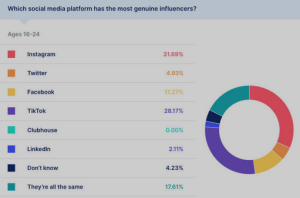The question of whether to trust Instagram and TikTok influencers is complex and depends on various factors. Influencers on these platforms can play a significant role in shaping opinions, promoting products, and influencing trends. However, there are both positive and negative aspects to consider:

Should we Trust Instagram and TikTok Influencers?
Table of Contents
ToggleReasons to Trust Influencers:
- Authenticity:
- Many influencers share authentic content, offering glimpses into their lives and experiences. This authenticity can build trust among their followers.
- Expertise in Niche Areas:
- Some influencers specialize in specific niches, such as beauty, fitness, or travel. If an influencer has genuine expertise in a particular area, their recommendations may be trustworthy.
- Transparency:
- Influencers who are transparent about sponsored content, partnerships, and affiliate relationships contribute to a more honest and open online environment.
- Community Engagement:
- Influencers often engage with their followers, responding to comments and fostering a sense of community. This interaction can create a more trustworthy relationship between the influencer and their audience.
- Product Reviews and Recommendations:
- Influencers may provide valuable insights into products or services. If an influencer consistently offers honest reviews and recommendations, their audience may trust their opinions.
Reasons to Approach with Caution:
- Sponsored Content and Bias:
- Influencers often collaborate with brands, and their content may be influenced by these partnerships. It’s essential to be aware of potential bias in sponsored content.
- Fake Followers and Engagement:
- Some influencers may artificially inflate their follower numbers or engagement metrics. This deceptive practice can mislead brands and followers about an influencer’s true reach and impact.
- Lack of Expertise:
- Not all influencers have genuine expertise in the products or services they promote. It’s important to assess whether an influencer’s recommendations are based on genuine knowledge or simply on sponsorship.
- Unrealistic Standards:
- Influencers often present curated and idealized versions of their lives. This can contribute to unrealistic standards and perceptions, potentially impacting the mental well-being of their audience.
- Ethical Concerns:
- Some influencers may engage in questionable practices or endorse products without considering the potential ethical implications. It’s crucial for followers to be aware of an influencer’s values and principles.
- Frequent Changes in Endorsements:
- If an influencer frequently changes the products or services they endorse, it may raise questions about the authenticity of their recommendations and the motivations behind those changes.
Tips for Evaluating Trustworthiness:
- Check Authenticity:
- Look for signs of authenticity, such as genuine engagement, consistent messaging, and transparency about partnerships.
- Evaluate Expertise:
- Assess whether the influencer has expertise in the areas they discuss. Knowledgeable influencers are more likely to provide trustworthy information.
- Verify Sponsorships:
- Be aware of sponsored content and verify whether the influencer discloses partnerships. Transparent influencers are generally more trustworthy.
- Review Engagement Metrics:
- Evaluate the influencer’s engagement metrics and look for signs of authenticity. Rapidly growing follower numbers without corresponding engagement may be a red flag.
- Consider Long-Term Relationships:
- Influencers who maintain long-term relationships with brands and consistently endorse products may be more trustworthy than those who frequently change endorsements.
In conclusion, trust in Instagram and TikTok influencers should be approached with a critical mindset. While many influencers are authentic and provide valuable content, it’s essential for followers to be discerning and consider various factors when assessing trustworthiness. Developing a healthy skepticism and staying informed about an influencer’s practices can contribute to a more meaningful and trustworthy online experience.
